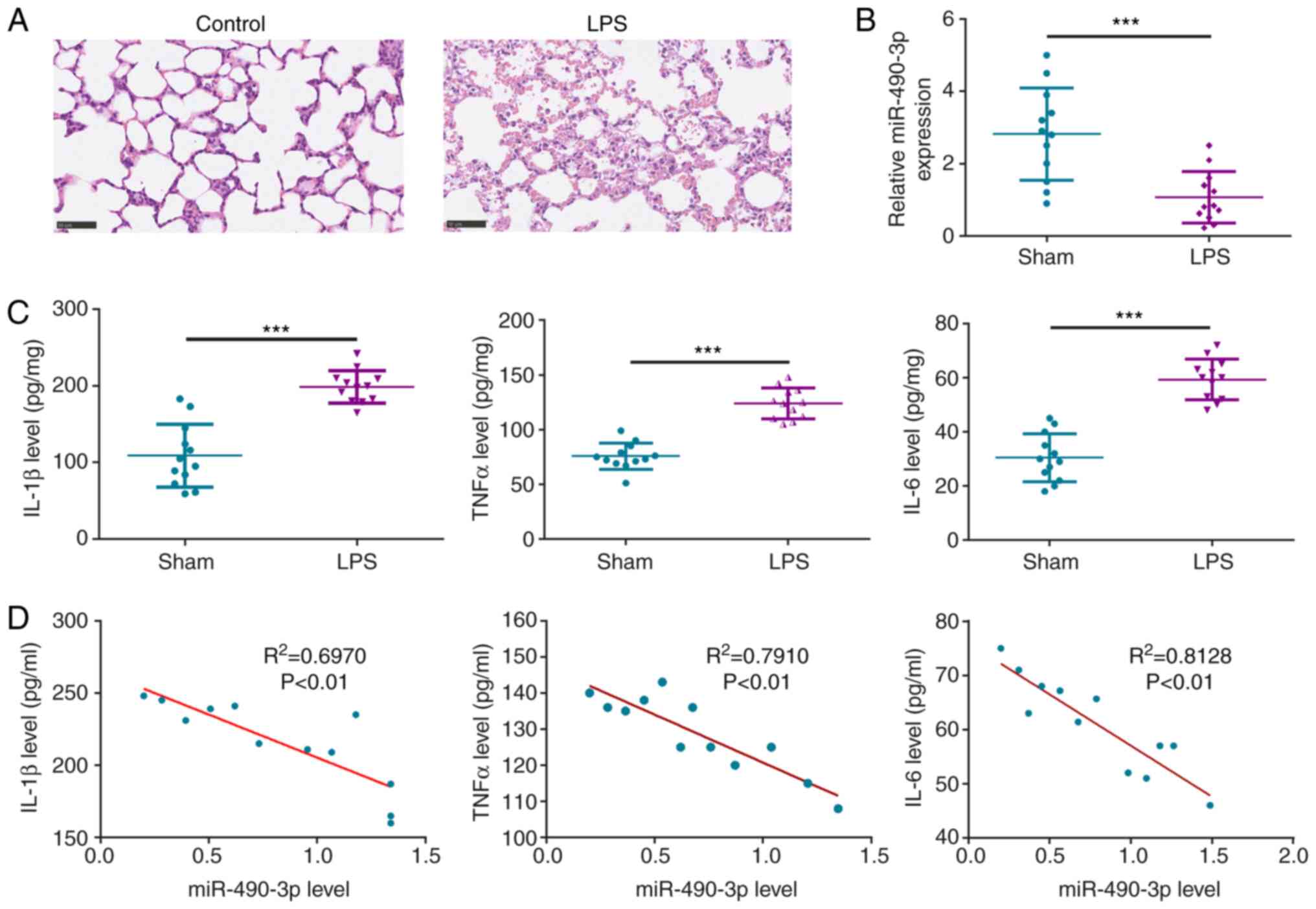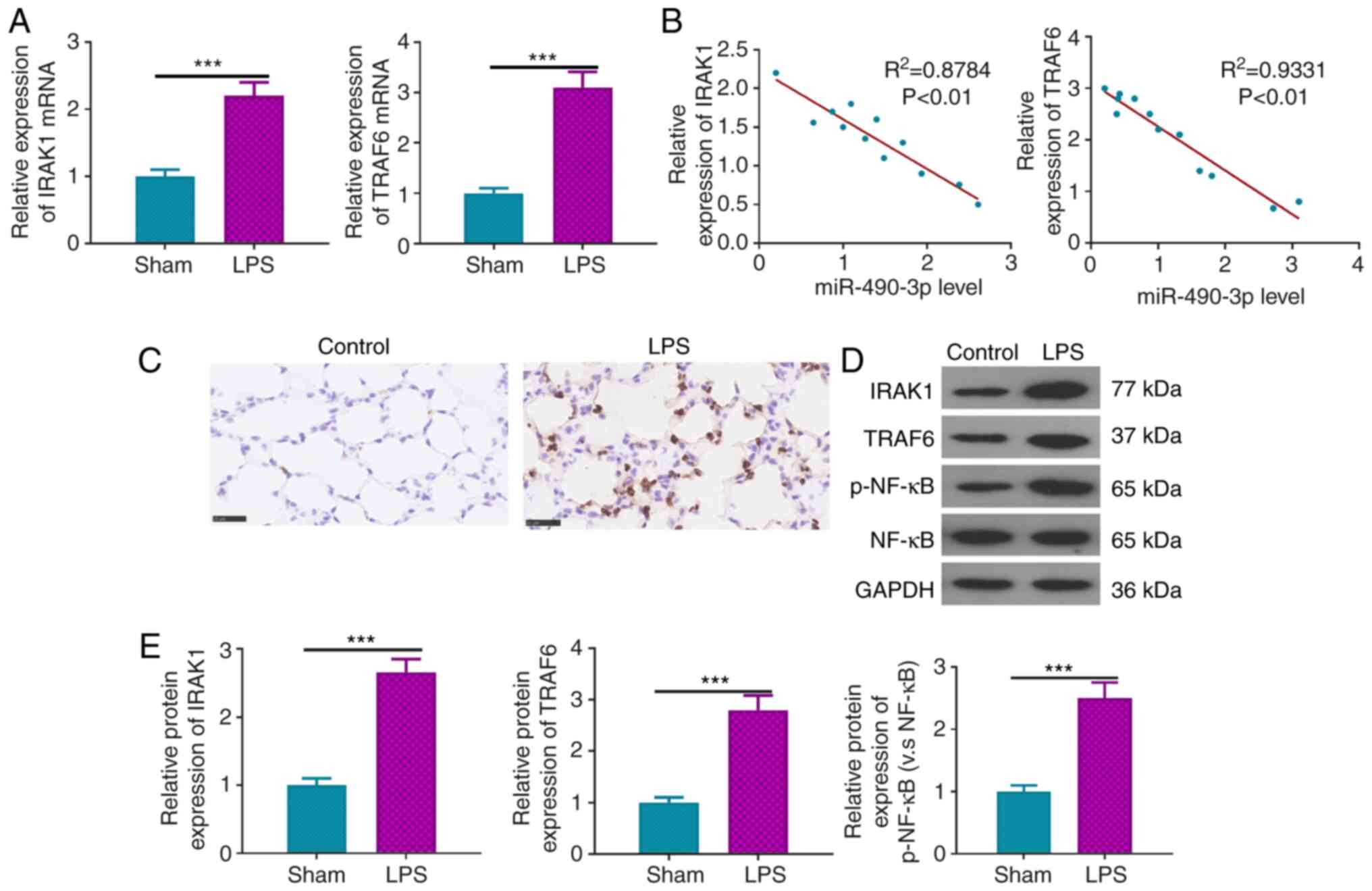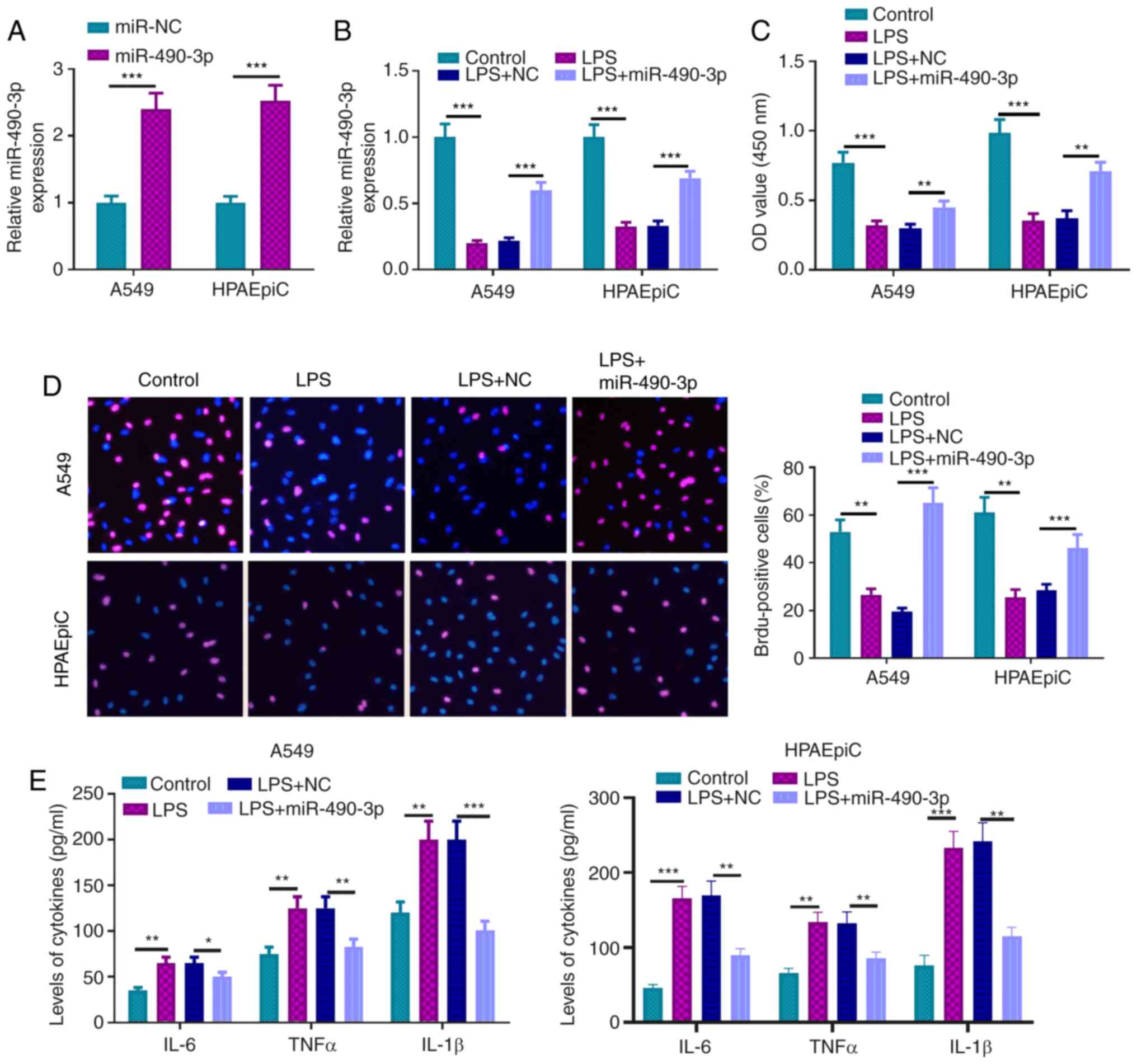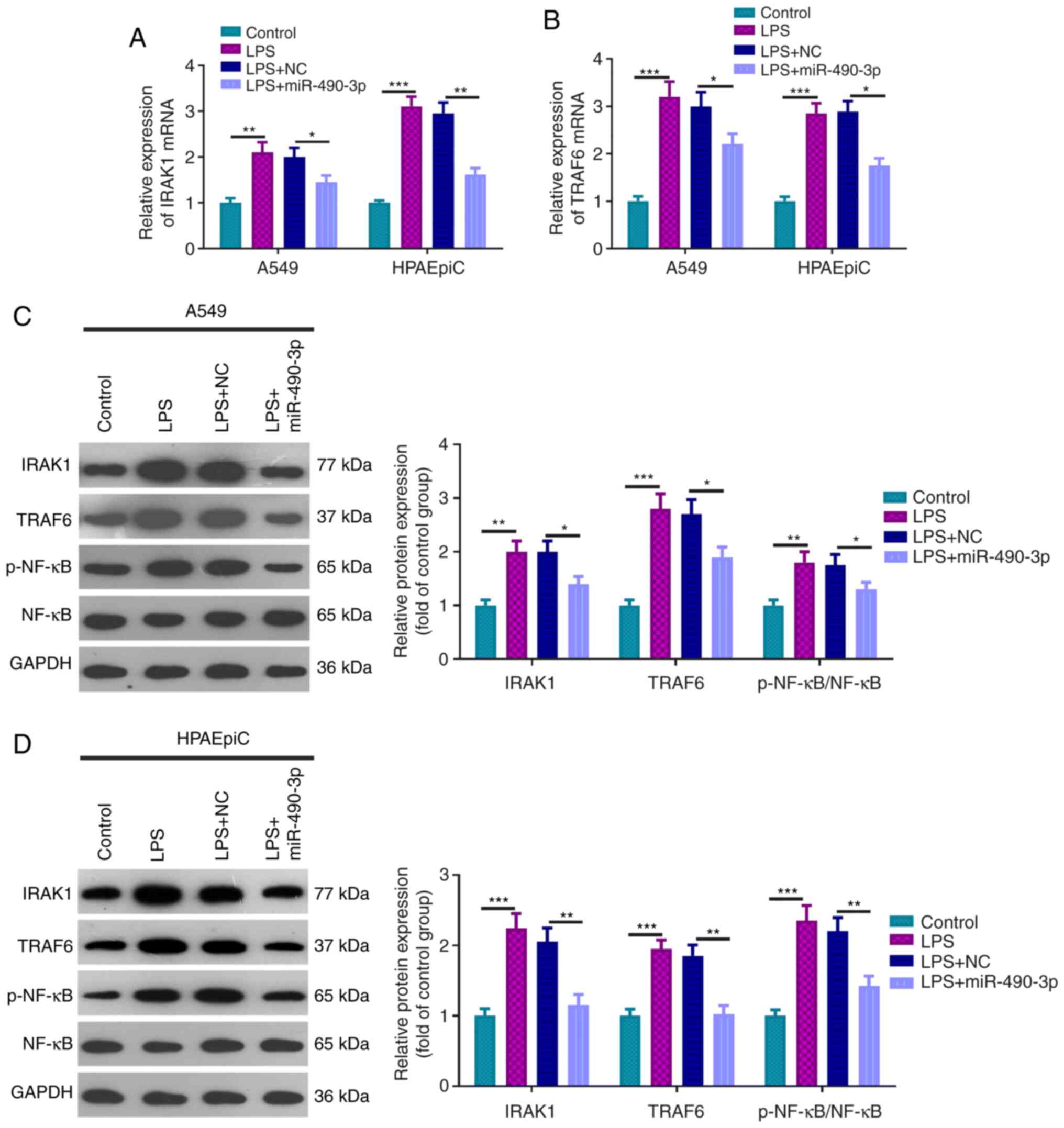|
1
|
Chen H, Bai C and Wang X: The value of the
lipopolysaccharide-induced acute lung injury model in respiratory
medicine. Expert Rev Respir Med. 4:773–783. 2010.PubMed/NCBI View Article : Google Scholar
|
|
2
|
Huang X, Xiu H, Zhang S and Zhang G: The
role of macrophages in the pathogenesis of ALI/ARDS. Mediators
Inflamm. 2018(1264913)2018.PubMed/NCBI View Article : Google Scholar
|
|
3
|
Liu H, Yu X, Yu S and Kou J: Molecular
mechanisms in lipopolysaccharide-induced pulmonary endothelial
barrier dysfunction. Int Immunopharmacol. 29:937–946.
2015.PubMed/NCBI View Article : Google Scholar
|
|
4
|
Killien EY, Mills B, Watson RS, Vavilala
MS and Rivara FP: Morbidity and mortality among critically injured
children with acute respiratory distress syndrome. Crit Care Med.
47:e112–e119. 2019.PubMed/NCBI View Article : Google Scholar
|
|
5
|
Saliminejad K, Khorram Khorshid HR,
Soleymani Fard S and Ghaffari SH: An overview of microRNAs:
Biology, functions, therapeutics, and analysis methods. J Cell
Physiol. 234:5451–5465. 2019.PubMed/NCBI View Article : Google Scholar
|
|
6
|
Essandoh K, Li Y, Huo J and Fan GC:
MiRNA-mediated macrophage polarization and its potential role in
the regulation of inflammatory response. Shock. 46:122–131.
2016.PubMed/NCBI View Article : Google Scholar
|
|
7
|
Yao Y, Xu K, Sun Y, Tian T, Shen W, Sun F,
Yuan W, Wu H, Chen G, Yuan L, et al: MiR-215-5p inhibits the
inflammation injury in septic H9c2 by regulating ILF3 and LRRFIP1.
Int Immunopharmacol. 78(106000)2020.PubMed/NCBIdoi: 10.1016/j.intimp.2019.106000.
|
|
8
|
Yan Z, Zang B, Gong X, Ren J and Wang R:
MiR-214-3p exacerbates kidney damages and inflammation induced by
hyperlipidemic pancreatitis complicated with acute renal injury.
Life Sci. 241(117118)2020.PubMed/NCBI View Article : Google Scholar
|
|
9
|
Li P, Yao Y, Ma Y and Chen Y: MiR-150
attenuates LPS-induced acute lung injury via targeting AKT3. Int
Immunopharmacol. 75(105794)2019.PubMed/NCBI View Article : Google Scholar
|
|
10
|
Suo T, Chen GZ, Huang Y, Zhao KC, Wang T
and Hu K: miRNA-1246 suppresses acute lung injury-induced
inflammation and apoptosis via the NF-κB and Wnt/β-catenin signal
pathways. Biomed Pharmacother. 108:783–791. 2018.PubMed/NCBI View Article : Google Scholar
|
|
11
|
Zhang F, Wu A, Wang Y and Liu J:
miR-490-3p functions as a tumor suppressor in glioma by inhibiting
high-mobility group AT-hook 2 expression. Exp Ther Med. 18:664–670.
2019.PubMed/NCBI View Article : Google Scholar
|
|
12
|
Liu Y, Zhang M, Lou L, Li L, Zhang Y, Chen
W, Zhou W, Bai Y and Gao J: IRAK-M Associates with susceptibility
to adult-onset asthma and promotes chronic airway inflammation. J
Immunol. 202:899–911. 2019.PubMed/NCBI View Article : Google Scholar
|
|
13
|
Sharma A, Maurya CK, Arha D, Rai AK, Singh
S, Varshney S, Schertzer JD and Tamrakar AK: Nod1-mediated
lipolysis promotes diacylglycerol accumulation and successive
inflammation via PKCδ-IRAK axis in adipocytes. Biochim Biophys Acta
Mol Basis Dis. 1865:136–146. 2019.PubMed/NCBI View Article : Google Scholar
|
|
14
|
Zhang QB, Qing YF, Yin CC, Zhou L, Liu XS,
Mi QS and Zhou JG: Mice with miR-146a deficiency develop severe
gouty arthritis via dysregulation of TRAF 6, IRAK 1 and NALP3
inflammasome. Arthritis Res Ther. 20(45)2018.PubMed/NCBI View Article : Google Scholar
|
|
15
|
Wang J, Wu J, Cheng Y, Jiang Y and Li G:
Over-expression of microRNA-223 inhibited the proinflammatory
responses in Helicobacter pylori-infection macrophages by
down-regulating IRAK-1. Am J Transl Res. 8:615–622. 2016.PubMed/NCBI
|
|
16
|
Shekarforoush S, Fatahi Z and Safari F:
The effects of pentobarbital, ketamine-pentobarbital and
ketamine-xylazine anesthesia in a rat myocardial ischemic
reperfusion injury model. Lab Anim. 50:179–184. 2016.PubMed/NCBI View Article : Google Scholar
|
|
17
|
Francischi JN, Frade TIC, Almeida MPA,
Queiroz BFG and Bakhle YS: Ketamine-xylazine anaesthesia and
orofacial administration of substance P: A lethal combination in
rats. Neuropeptides. 62:21–26. 2017.PubMed/NCBI View Article : Google Scholar
|
|
18
|
Kocaturk H, Bedir F, Altay MS, Bakan E,
Suleyman B, Yazici GN, Sunar M, Suleyman Z and Suleyman H: The
effect of desloratadine on ischemia reperfusion induced oxidative
and inflammatory renal injury in rats. Ren Fail. 42:531–538.
2020.PubMed/NCBI View Article : Google Scholar
|
|
19
|
Livak KJ and Schmittgen TD: Analysis of
relative gene expression data using real-time quantitative PCR and
the 2(-Δ Δ C(T)) Method. Methods. 25:402–408. 2001.PubMed/NCBI View Article : Google Scholar
|
|
20
|
Li JH, Liu S, Zhou H, Qu LH and Yang JH:
starBase v2.0: Decoding miRNA-ceRNA, miRNA-ncRNA and protein-RNA
interaction networks from large-scale CLIP-Seq data. Nucleic Acids
Res. 42 (D1):D92–D97. 2014.PubMed/NCBI View Article : Google Scholar
|
|
21
|
Chakraborty M, McGreal EP and Kotecha S:
Acute lung injury in preterm newborn infants: Mechanisms and
management. Paediatr Respir Rev. 11:162–170; quiz 170.
2010.PubMed/NCBI View Article : Google Scholar
|
|
22
|
Cheng N, Liang Y, Du X and Ye RD: Serum
amyloid A promotes LPS clearance and suppresses LPS-induced
inflammation and tissue injury. EMBO Rep. 19(e45517)2018.PubMed/NCBI View Article : Google Scholar
|
|
23
|
Wang Q and Xiao L: Isochlorogenic acid A
attenuates acute lung injury induced by LPS via Nf-κB/NLRP3
signaling pathway. Am J Transl Res. 11:7018–7026. 2019.PubMed/NCBI
|
|
24
|
Yang H, Song Z and Hong D: CRBN knockdown
mitigates lipopolysaccharide-induced acute lung injury by
suppression of oxidative stress and endoplasmic reticulum (ER)
stress associated NF-κB signaling. Biomed Pharmacother.
123(109761)2020.PubMed/NCBI View Article : Google Scholar
|
|
25
|
Lee HM, Kim TS and Jo EK: MiR-146 and
miR-125 in the regulation of innate immunity and inflammation. BMB
Rep. 49:311–318. 2016.PubMed/NCBI View Article : Google Scholar
|
|
26
|
Haneklaus M, Gerlic M, O'Neill LA and
Masters SL: miR-223: Infection, inflammation and cancer. J Intern
Med. 274:215–226. 2013.PubMed/NCBI View Article : Google Scholar
|
|
27
|
Wang R, Yang Y, Wang H, He Y and Li C:
MiR-29c protects against inflammation and apoptosis in Parkinson's
disease model in vivo and in vitro by targeting SP1. Clin Exp
Pharmacol Physiol. 47:372–382. 2020.PubMed/NCBI View Article : Google Scholar
|
|
28
|
Wu J, Lu K, Zhu M, Xie X, Ding Y, Shao X,
Chen Y, Liu J, Xu M, Xu Y, et al: miR-485 suppresses inflammation
and proliferation of mesangial cells in an in vitro model of
diabetic nephropathy by targeting NOX5. Biochem Biophys Res Commun.
521:984–990. 2020.PubMed/NCBI View Article : Google Scholar
|
|
29
|
Meng L, Cao H, Wan C and Jiang L:
MiR-539-5p alleviates sepsis-induced acute lung injury by targeting
ROCK1. Folia Histochem Cytobiol. 57:68–178. 2019.PubMed/NCBI View Article : Google Scholar
|
|
30
|
Yang Y, Yang C, Guo Y-F, Liu P, Guo S,
Yang J, Zahoor A, Shaukat A and Deng G: MiR-142a-3p alleviates
Escherichia coli derived lipopolysaccharide-induced acute
lung injury by targeting TAB2. Microb Pathog.
136(103721)2019.PubMed/NCBI View Article : Google Scholar
|
|
31
|
Xie W, Lu Q, Wang K, Lu J, Gu X, Zhu D,
Liu F and Guo Z: miR-34b-5p inhibition attenuates lung inflammation
and apoptosis in an LPS-induced acute lung injury mouse model by
targeting progranulin. J Cell Physiol. 233:6615–6631.
2018.PubMed/NCBI View Article : Google Scholar
|
|
32
|
Cheng K, Yang A, Hu X, Zhu D and Liu K:
Curcumin attenuates pulmonary inflammation in lipopolysaccharide
induced acute lung injury in neonatal rat model by activating
peroxisome proliferator-activated receptor γ (PPARγ) pathway. Med
Sci Monit. 24:1178–1184. 2018.PubMed/NCBI View Article : Google Scholar
|
|
33
|
Duan Q, Jia Y, Qin Y, Jin Y, Hu H and Chen
J: Narciclasine attenuates LPS-induced acute lung injury in
neonatal rats through suppressing inflammation and oxidative
stress. Bioengineered. 11:801–810. 2020.PubMed/NCBI View Article : Google Scholar
|
|
34
|
Wang X, Zhang C, Chen C, Guo Y, Meng X and
Kan C: Allicin attenuates lipopolysaccharide-induced acute lung
injury in neonatal rats via the PI3K/Akt pathway. Mol Med Rep.
17:6777–6783. 2018.PubMed/NCBI View Article : Google Scholar
|
|
35
|
Yang D, Li S, Duan X, Ren J, Liang S,
Yakoumatos L, Kang Y, Uriarte SM, Shang J, Li W, et al: TLR4
induced Wnt3a-Dvl3 restrains the intensity of inflammation and
protects against endotoxin-driven organ failure through
GSK3β/β-catenin signaling. Mol Immunol. 118:153–164.
2020.PubMed/NCBI View Article : Google Scholar
|
|
36
|
Zhang B, Zeng M, Li M, Kan Y, Li B, Xu R,
Wu Y, Wang S, Zheng X and Feng W: Protopine protects mice against
LPS-induced acute kidney injury by inhibiting apoptosis and
inflammation via the TLR4 signaling pathway. Molecules.
25(25)2019.PubMed/NCBI View Article : Google Scholar
|
|
37
|
Yan S, Wang P, Wang J, Yang J, Lu H, Jin
C, Cheng M and Xu D: Long non-coding RNA HIX003209 promotes
inflammation by sponging miR-6089 via TLR4/NF-κB signaling pathway
in rheumatoid arthritis. Front Immunol. 10(2218)2019.PubMed/NCBI View Article : Google Scholar
|
|
38
|
Giriwono PE, Shirakawa H, Ohsaki Y, Sato
S, Aoyama Y, Ho HJ, Goto T and Komai M: Geranylgeraniol suppresses
the expression of IRAK1 and TRAF6 to inhibit NF-κB activation in
lipopolysaccharide-induced inflammatory responses in human
macrophage-like cells. Int J Mol Sci. 20(20)2019.PubMed/NCBI View Article : Google Scholar
|
|
39
|
Lei J, Fu Y, Zhuang Y, Zhang K and Lu D:
miR-382-3p suppressed IL-1β induced inflammatory response of
chondrocytes via the TLR4/MyD88/NF-κB signaling pathway by directly
targeting CX43. J Cell Physiol. 234:23160–23168. 2019.PubMed/NCBI View Article : Google Scholar
|
|
40
|
Sun X and Zhang H: miR-451 elevation
relieves inflammatory pain by suppressing microglial
activation-evoked inflammatory response via targeting TLR4. Cell
Tissue Res. 374:487–495. 2018.PubMed/NCBI View Article : Google Scholar
|
|
41
|
Yang Y, Yang F, Yu X, Wang B, Yang Y and
Zhou X, Cheng R, Xia S and Zhou X: miR-16 inhibits NLRP3
inflammasome activation by directly targeting TLR4 in acute lung
injury. Biomed Pharmacother. 112(108664)2019.PubMed/NCBI View Article : Google Scholar
|
|
42
|
Xie MY, Hou LJ, Sun JJ, Zeng B, Xi QY, Luo
JY, Chen T and Zhang YL: Porcine milk exosome MiRNAs attenuate
LPS-induced apoptosis through inhibiting TLR4/NF-κB and p53
pathways in intestinal epithelial cells. J Agric Food Chem.
67:9477–9491. 2019.PubMed/NCBI View Article : Google Scholar
|
|
43
|
Zeng R, Xu H, Liu Y, Du L, Duan Z, Tong J,
He Y, Chen Q, Chen X and Li M: miR-146a inhibits biofilm-derived
cutibacterium acnes-induced inflammatory reactions in human
keratinocytes. J Invest Dermatol. 139:2488–2496.e4. 2019.PubMed/NCBI View Article : Google Scholar
|
|
44
|
Zeng Z, Gong H, Li Y, Jie K, Ding C, Shao
Q, Liu F, Zhan Y, Nie C, Zhu W, et al: Upregulation of miR-146a
contributes to the suppression of inflammatory responses in
LPS-induced acute lung injury. Exp Lung Res. 39:275–282.
2013.PubMed/NCBI View Article : Google Scholar
|



















